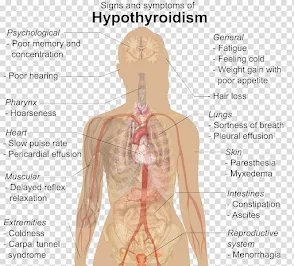Hypothyroidism is a malfunctioning of thyroid gland. Imagine feeling drained, mentally clouded, and unable to lose those persistent extra pounds, no matter how hard you try, every morning. These seemingly unconnected symptoms may be brought on by Hypothyroidism, a disorder that is frequently misdiagnosed. Even though it has a huge global influence, many people are ignorant of how it affects general health and well-being. We'll indulge in the origins, signs, and treatments of Hypothyroidism in this blog to help you better understand and take control of this metabolic illness.
Hypothyroidism: What is it?
Hypothyroidism is a medical condition's primary cause is a thyroid gland that is not functioning properly i e.when it's function is hampered.You might be curious as to what the thyroid gland is and why it is so crucial. Thyroxine (T4) and triiodothyronine (T3) are essential hormones produced by the thyroid gland, a butterfly-shaped gland in the neck. These hormones are essential for controlling a variety of human activities, including metabolism, energy levels, heart rate, and body temperature.
 |
| Cancer of thyroid |
Hypothyroidism causes:
Let's examine the common causes of Hypothyroidism now that we are aware of the relevance of the thyroid gland:
1)The most common cause of Hypothyroidism is Hashimoto's thyroiditis. It is an Autoimmune illness in which the thyroid gland is inappropriately attacked by the Immune system, causing inflammation and decreased hormone production.autoimmune-diseases
2)Iodine deficiency: Iodine acts as the thyroid gland's superhero since it is a necessary ingredient for the creation of thyroid hormones. Iodine deficiency in the diet can cause Hypothyroidism.
3)Thyroid surgery or radioactive iodine therapy: Specific thyroid-related medical procedures might result in decreased hormone production, which results in Hypothyroidism.amenorrhea
4)Congenital Hypothyroidism: Due to hereditary conditions or problems during fetal development, some newborns are born with an underactive thyroid gland.
5)Surprisingly, some drugs like lithium and amiodarone can prevent the thyroid from producing hormones, which can lead to Hypothyroidism.anemia
 |
| Hypothyroid Illusteration |
Typical Symptoms of hypothyrodism
The tough aspect of Hypothyroidism is that its symptoms frequently appear gradually, making it difficult to identify at first. The following are some typical warning signs and symptoms to watch out for:
1)Feeling continually exhausted, even after getting a decent night's sleep.
2)Gaining Weight and Difficulties Losing Weight: Those excess pounds simply won't go away despite your best efforts.
3)Feeling too chilly, especially in your hands and feet, is known as cold intolerance.
4)Your skin feels tight and flaky, and your hair becomes brittle from dryness.
5)Constipation: Uncomfortable and irregular bowel movements.
6)Joint and muscle pain: experiencing pain and stiffness in your joints and muscles.
7)Dealing with persistently depressed or downtrodden feelings.
8)Memory Issues and Concentration Issues: Having trouble focusing or remembering things.
9)Changes in the menstrual cycle can cause irregular or heavy menstrual periods in women.
It is important to remember that not everyone will have all of these symptoms and that each person's symptom intensity will differ.
Diagnosis and Treatment of hypothyroidism
It's crucial to get advice from a healthcare provider if you think you could have Hypothyroidism or exhibit any of the above symptoms. To confirm the diagnosis, they will do a thorough evaluation that includes a physical examination and blood tests to measure thyroid hormone levels (TSH, T3, T4).
The good news is that Hypothyroidism can be treated effectively after it has been detected and managed. The main strategy is hormone replacement treatment, in which Levothyroxine, a synthetic thyroid hormone, is provided to augment the body's insufficient hormone production. Individual needs are carefully considered while adjusting the dosage, and progress is checked on a regular basis with follow-up appointments.
Lifestyle modifications and dealing with Hypothyroidism:
For those with Hypothyroidism, there are numerous lifestyle modifications that can supplement medicine and enhance the quality of life:
1)Balanced Diet: Iodine and selenium are nutrients that support thyroid function, so choose a diet high in these nutrients. To nourish your body, prioritize nutritious meals, fruits, vegetables, and lean meats.
2)Exercise on a Regular Basis: Physical activity on a regular basis can help raise energy, metabolism, and general well-being.
3)Stress management: Prolonged stress can impair thyroid function, so give stress-relieving practices like yoga, meditation, or engaging in hobbies a high priority.hypothyroidism
4)Medication Compliance: To ensure the best possible management of Hypothyroidism, take your medication exactly as directed, at the proper time.
Conclusion:
A widespread ailment that frequently goes undiagnosed, Hypothyroidism affects many people all over the world. For an early diagnosis and efficient management, it is crucial to understand its causes, symptoms, and available treatments. People with Hypothyroidism can live fulfilling lives and preserve their general health and well-being with the help of appropriate medical treatment, lifestyle modifications, and medication adherence.hypothyroidism-underactive thyroid
Remember, visit a healthcare expert for a comprehensive evaluation and suitable advice if you believe you may have Hypothyroidism or suffer any related symptoms. With the correct information and assistance, you can take charge of your thyroid health and set off on a path to a happier, healthier you.



No comments:
Post a Comment